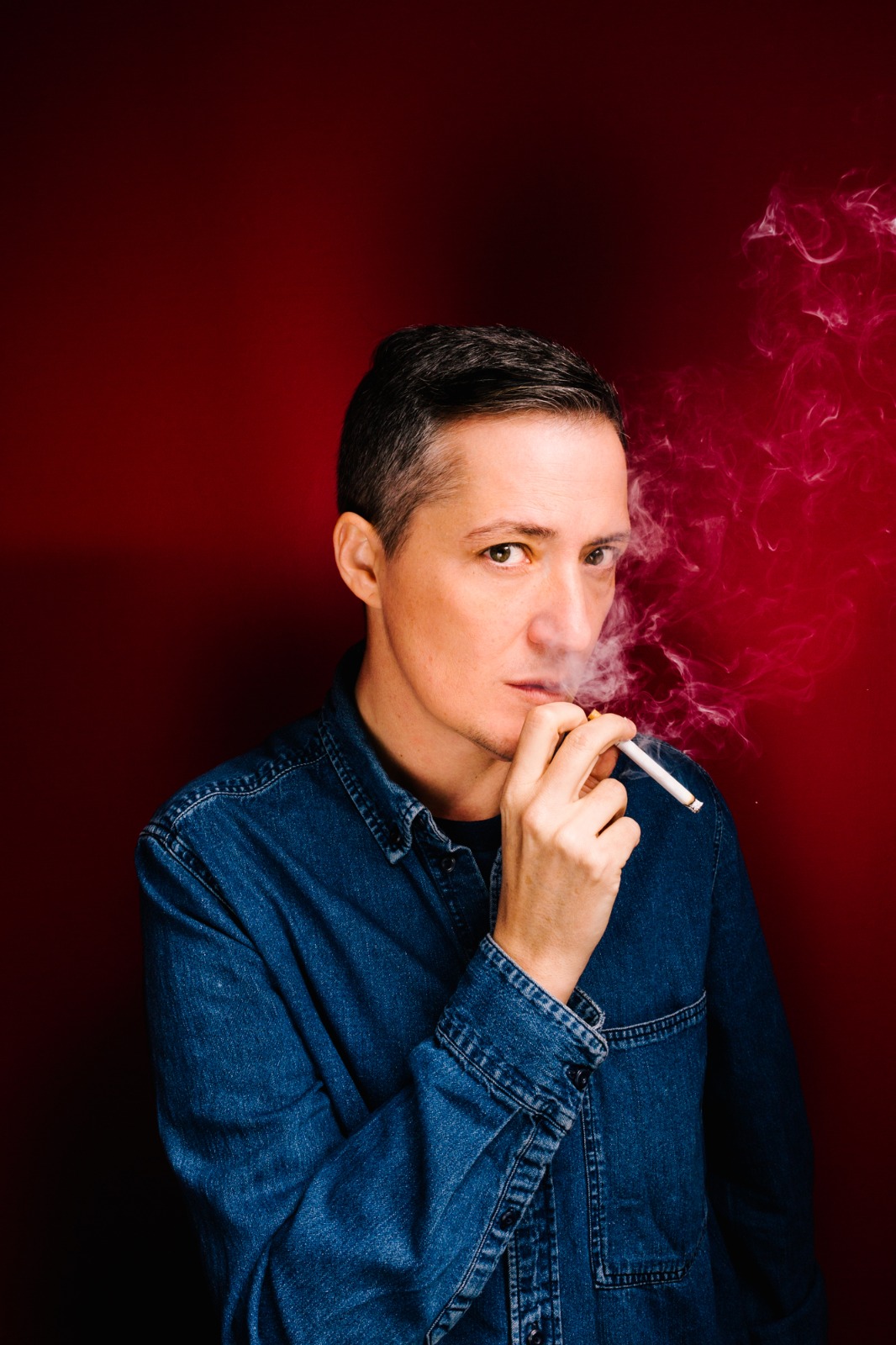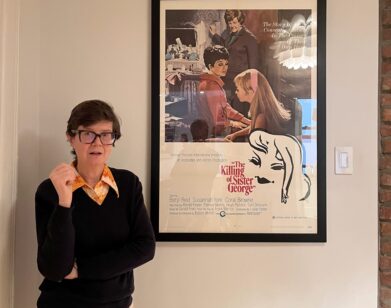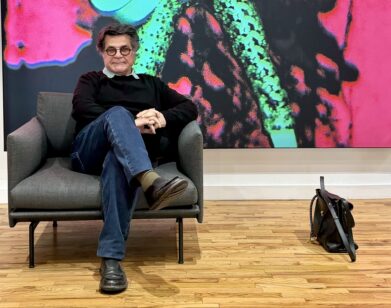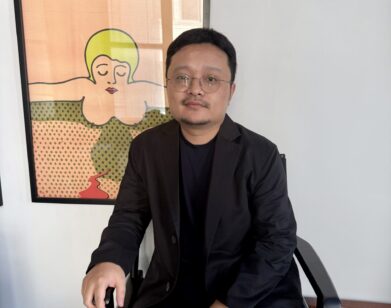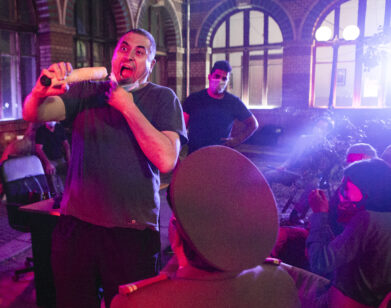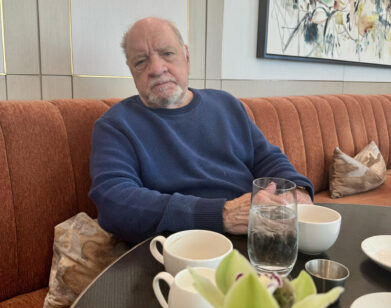NYFF
Paul Preciado on Binaries, Barbie, and Adapting Virginia Woolf
For Paul Preciado, our cis-hetero-patriarchal society is ruled by what he refers to as “the regime of sexual difference.” A writer and philosopher, Preciado first gained mainstream attention for his “body essay” Testo Junkie, a memoir of sorts published in 2008 and translated into English in 2013. In the book, Preciado, who is a transgender man, recounts his experiences with self-administering testosterone, and he has also been a longtime contributor to the French newspaper Libération, where he writes about sex, gender, and politics. Now, with the inventive and playfully radical Orlando: My Political Biography, Preciado has taken up filmmaking.The film, the only nonfiction one included in the main slate of the 61st New York Film Festival, and slated to open wide at Film Forum on November 10th, is more than a mere adaptation of Virginia Woolf’s novel Orlando: A Biography–it is a transformation. In Woolf’s Orlando, the titular character magically changes from a man to a woman and lives for hundreds of years. In Preciado’s Orlando, dozens of real-life trans and non-binary individuals play the part of the poet, blending fact and fiction, crashing narratives into one another.
Now more than ever, we could really learn a thing or two from Preciado. The gender binary has come blazing back, thanks to memes about “girl dinner,” the Roman Empire, and a little independent film that came out this summer called Barbie. In the film’s final scene, Margot Robbie’s Barbie, now a human being, excitedly announces to a receptionist that she’s ready to see her gynecologist, bluntly reinforcing an essentialist punchline. And Barbie’s main box office opponent, Oppenheimer, only amplified a crude dichotomy—the bright pink doll movie is for girls and the brooding, dark, bomb movie is for boys. Smart, wry, and truly revolutionary, Preciado’s Orlando offers a powerful antidote to not only the regime of sexual difference, but that of the billion dollar corporate blockbuster, too. After his film premiered in New York, he and I sat down to discuss Deleuze, Virginia Woolf, and the origins of his fascination with language.
———
PAUL PRECIADO: Here we are.
CONOR WILLIAMS: I want to start off talking a bit about Deleuze, actually.
PRECIADO: Okay.
WILLIAMS: In 1987, he gave a talk called “What Is the Creative Act?” where he spoke a bit about the role of the philosopher and the filmmaker. You are a writer and a philosopher, and now you’ve taken on the role of a filmmaker. About filmmakers who adapt novels, Deleuze says there has to be some specifically cinematic idea in the novel. So I’m wondering, with Orlando, if there was a cinematic idea that spoke to you.
PRECIADO: It’s funny that you speak about Deleuze because, of course, when I started making the film, I was rereading Deleuze. With time, I see Godard more as a philosopher in relation to cinema than Deleuze himself. Sometimes, I don’t agree so much with Deleuze, really. I think that Orlando is a book about time. The novel takes place from 1500 up to 1928, so it seems that the true character of the novel is time itself. It’s almost like you become the spectator to the mutation of time itself, and I thought that was very cinematic, almost as if the novel was already a premonition for cinema, or something like that. I like your question, in the sense that most people don’t ask these kinds of questions. At the beginning, I was also looking at an essay by Virginia Woolf called “On Cinema,” written in 1927. Orlando comes out in ’28, and I thought it was very funny that she was thinking and reflecting on cinema while writing Orlando. She went to see a film called The Sea. Virginia Woolf is so fascinated by water and the sea and everything, and she was completely mesmerized by this film. And the idea she’s communicating in this article is what a sensation it was, being in the water without being wet, because of the film. She thought that films were deceptive. But I always thought that she was already having a very cinematic vision of Orlando herself. So even when I started to film, I had this non-hierarchical way of filming, which is not giving more prevalence to something over something else. I think that’s also very Virginia Woolf, the way her narrating mind is going from object to object.
WILLIAMS: Deleuze also says, about the Straubs, that speech in their films is an act of resistance. When did you realize that your words could be used not just in a creative sense, but also in a political sense?
PRECIADO: Honestly, as a writer, I think I always felt that words are like direct action. I always saw it as a kind of a grail, or something like that. That’s the kind of writing that I’ve always been more attracted to. This strange language of legality, for instance, or even words that are written on money. Words that do things were always very appealing to me. And I think maybe that’s the reason why the first thing that I wrote was a manifesto. That’s the reason you become a writer, maybe, because you wish to steal the power of some of these types of speech and use it differently. To betray the power of the speech, or you use it against itself.
WILLIAMS: In a lot of your writing, you talk about what you call the “regime of sexual difference.” Can you explain what you mean by that?
PRECIADO: For most people, if I say sexual difference, they just think that this is a fact of biology. Whereas, as a philosopher and a historian of sexuality, what I have learned with time is that sexual difference, what I call the “binary regime,” is an epistemology. It’s a conceptual, cognitive way of looking at things. And I guess that’s kind of counterintuitive for most people. But historically, for instance, even within anatomy, the binary difference as we know it didn’t exist until probably the 17th or 18th century. What I’m saying is that, for instance, in the anatomical discourse or even in legal discourses, what you have is just like a monosexual regime, a regime in which basically only the male body exists as a perfect body, as a kind of economic body. And then what you have is the female as being a subordinate, deficient body, or something like that. And that is a regime, or let’s say a framework, a conceptual way of looking at reality that prevails until the 17th and 18th century, when you have the inscription within the anatomical discourse of the female body as being a completely different body than the male one.
WILLIAMS: So how does one combat the regime of sexual difference?
PRECIADO: Let’s take the example of women, because I think that it’s easier for most people to realize that. Because if I say non-binary, people think, “What is that?” So, for a long time, let’s say that women existed but they had no representation, no inscription, either as anatomical beings or as legal and political subjects. Nevertheless, they more or less existed. They had a politically subaltern existence, right? But then with time, they enter the frame of vision, the frame of description, that now everyone says, “Okay, there are women, there are men and women,” and no one is putting that into question. My contention is that eventually, and ideally, there is an irreducible multiplicity of beings, right? Some people think that my position is utopian, or completely ideological, or whatever. But I think that I’m more of a realist than most people. Now, we see that that conceptual framework is changing and being reorganized to allow for enough space for other bodies and other social realities to enter this frame of vision, representation, legal existence, and so on. It’s not just a question of description, but it’s also the question of power: why some bodies have been historically thought of as being sovereign and others not? You could also explain it as a question of redistribution of sovereignty, a reshuffling of what we’ll call the technologies of power, right?
WILLIAMS: Sure.
PRECIADO: It’s not a question of diversity of gender, but it’s a question of power. That’s really important. What are the bodies that in a particular society have the right to define the conditions under which they are represented? Sometimes people think of these as categories. But they’re not. Gender is not a category. It’s a practice, a social practice that is done and constructed through an accumulation of hundreds of thousands of social techniques. Language is one. Visual representation is another. For instance, photography, historically, then cinema. Passports are another one, and money. That’s why, for me, there are not so many differences between philosophy and cinema. Some people are like, “Wow, you were doing books, and now you’re making a film.” But the questions are not so different. Because in reality, for me, a society is basically a crystallized naturalization of the technologies of production of subjects, which we don’t see as techniques anymore.
WILLIAMS: And cinema is another technique of spreading that message.
PRECIADO: Exactly. That’s the way I see it. But it’s a technology that is a tricky one. It’s transforming and moving and will be different in the next 10, 15 years. But it has been, at least during the 20th century, the hegemonic cultural industry. And that’s not negotiable. This is super important in relation to philosophy. Who cares about philosophy, anyway? You know what I mean? It was a very prominent governmental technique in the 18th century. If you look at the French Revolution, everything was done with philosophy mostly. But today, other technologies such as cinema are much more prominent than philosophy.
WILLIAMS: It seems that the media has gotten around to representing trans women on screen a little bit. But it still seems like trans men are kind of invisible on screen. Why do you think that is?
PRECIADO: That is a tricky question, because I don’t know if you could say that the media has represented trans women. From the perspective of the binary case, trans women have been the most eroticized body that has been onscreen. And maybe it’s not a good thing. But to come back to your question, I think that one of the reasons is that, historically, femininity is thought of as being less natural than masculinity, precisely because historically they’ve been subaltern to men, and they have been historically the object of representation in a much more incessive and aggressive way than men, anyway. I think the second reason is because this body can be much easily eroticized through the male heterosexual position, in a less threatening way. And I think the third reason is because sometimes transitioning into masculinity is less visible altogether, because masculinity is historically socially constructed as opacity. Basically as, “There is nothing to construct. It’s the way it is.” Right?
WILLIAMS: Yeah. It’s just the baseline.
PRECIADO: Yes. It’s almost like femininity is premium and masculinity seems like the basic, so [there’s] nothing to add.
WILLIAMS: Right. I want to ask you also about the Barbie movie. I know that sounds funny.
PRECIADO: I haven’t seen it.
WILLIAMS: Well, it seems like it’s kind of reintroduced the gender binary to the younger generation in a way, and made it seem fun.
PRECIADO: I agree with you. It’s very funny because I was in Telluride with Ruby Rich, who was one of the first people that had seen my film. And we were speaking about Barbie and then had the time to see it, and then she told me, “Don’t go, because you will suffer.” So I finally decided not to go, even though it’s been such a cultural event in a sense. Why now? Why this way? This madness of the binary again.
WILLIAMS: At the end of the film, she becomes a real woman and she gets to go to the gynecologist. So the whole punchline of the film reinforces this binary way of thinking.
PRECIADO: When I was speaking with Ruby Rich about the film and she was telling me the story and the whole thing, I also thought, “How interesting that both characters, Barbie and Ken, could also be trans.” You know what I mean? In the sense that they are kind of expecting to be fully recognized as male or female. It seems that because of being, of course, a doll, not being yet, there is something over this claim for recognition.
WILLIAMS: So you talked to trans children at the end of the film, and there’s been so many attacks on trans children over the past few years in this country. In the preface to your book, An Apartment on Uranus, Virginie Despentes wrote that you write to children who have not yet been born, who will live in constant transition. If you could say one thing to these children, what would it be?
PRECIADO: I grew up in a world where there were no trans children. I was a trans child without trans discourse, without trans community, so you had to construct yourself without absolutely no reference whatsoever. But now what is new, and I think quite fascinating, is that families and parents that are supposed to be very straight, very cis, call me and say, “I never read your books or anything, but I have a child at home that speaks exactly like you, and I need to understand what’s going on.” So I start talking to the kids and I realize that they speak exactly the same language as me, [the language] that I’ve been talking for almost 15 years now. I’m 53. So, I don’t tell them so many things. I listen to them. And I think that what we are seeing now, both within the trans and queer movements, and within the ecological movement, is the becoming political subject of “the kid.” Suddenly, it’s like they are saying, “Hey, no.”
WILLIAMS: They found their voice.
PRECIADO: Exactly. I feel that everything that I’ve done has a meaning thanks to them and because of them. I’m like, “Wow, you are much better than anything that I could have expected.” Because for so long, I was quite disappointed with the gay and lesbian community. And then, suddenly, the kids arrived, and I was like, “Okay, good. We’re safe.”
WILLIAMS: The kids are alright.
PRECIADO: Yes.

